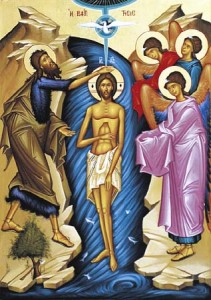 Epiphany’s Focus: Epiphany is about Christ manifest in us, and Christ manifest to the world through us.
Epiphany’s Focus: Epiphany is about Christ manifest in us, and Christ manifest to the world through us.- Epiphany’s Practice: Prayer and hospitality & outreach
Thoughts about the Feast of Epiphany took a very long hiatus for me between that first introduction in my high school days at Tarpon Springs High School and my second introduction more recently. It is safe to say, that the Feast of Epiphany has played absolutely no role in my spiritual life in my adulthood. I’m not very proud of this. While I know that there are perhaps millions of people for whom Epiphany is nothing more than an empty religious activity, for many it is a irreplaceable foundational stone in their yearly spiritual life.
The Christian Year
For reasons both logical and mysterious, I’ve made it a goal this year to follow the Christian Calendar. In the words of Robert Webber, I want to allow the Christian year to orient my spirituality. At base, the Christian year focuses the Church on the life-cycle of Jesus from his birth to his death. The Christian year focuses the worshiper on Jesus by syncing one’s life with his. Thus, as Webber notes, the Christian year is deeply evangelical. It is the Gospel, the story of Jesus. Following the calendar orients your life to the Story of Jesus. So one ends up experiencing the Gospel story.
The Christian year began in late November with the Advent. Advent brought in Christmas and today the Christmas season of the Christian calendar comes to its conclusion with the Feast of Epiphany. For most Christians, Christmas doesn’t technically end until today. I’ve talked with several people recently about Epiphany and several have mentioned that in their house growing up they didn’t take the Christmas decorations down until after Epiphany. The reason you would take them down before Jan 6th, is because it is still Christmas!
The Book of Common Prayer emphasizes this perspective by referring to the Sundays between Christmas and Epiphany as “First Sunday After Christmas” and “Second Sunday After Christmas” with an intervening celebration on Jan 1 called “The Holy Name” which commemorates the day Joseph and Mary named him “Jesus” – which means savior.
My guide for the Christian calendar has been the Book of Common Prayer and Robert Webber’s book Ancient-Future Time: Forming Spirituality through the Christian Year.
Epiphany
I mentioned in my post yesterday the word “epiphany” means “appearing”. In the early church the feast originally celebrated the birth of Jesus on Epiphany, but when the date of Christmas was moved to December 25, the church designated Epiphany as the day Jesus was manifest as the Son of God, the Savior of the world. In the East, Epiphany celebrates the Baptism of Jesus, but in the West, it is a day to celebrate the three great events of manifestation:
- The Visit of the Wise Men (Matt 2)
- The Baptism of Jesus (Matt 3 and parallels)
- The Wedding at Cana (John 2)
Epiphany is no just one day however. Rather Epiphany is a season that fills the calendar between Christmas and Lent, which begins in the middle of February. Depending on the year there are about 8 Sundays between Epiphany (Jan 6) and the beginning of Lent. Each Sunday, and its week, are Sundays and Weeks of Epiphany. Jesus’ manifestation to the world as Savior is the central focus of this season of the year.
Whereas Advent and Christmas focus our attention on expectation and the fulfillment of long-await promises leading to the spiritual challenge of patient faith-filled expectation and incarnational humility, Epiphany, with its focus on manifestation, challenges us to reveal Jesus to ourselves first and then to the world.
In terms of Jesus’ life, the Epiphany season focuses on Jesus’ public ministry. I think John’s Gospel is particularly useful as a guide because it is easily divided between (1) Jesus’ public ministry of revealing God through miraculous signs [Jn 1:19–10:42] and (2) his passion [Jn 11:1–21:25]. Epiphany relates to the first of the two halves of John’s Gospel’s story.
Webber outlines the topics for meditation during the season of Epiphany in this way: The Day of Epiphany – the Visit of the Wise Men, After Epiphany (or during the Epipany season leading to Lent) – Baptism, Wedding at Cana, the Calling of the Disciples, the Training of the Discples, and the Transfiguration.
Epiphany has both a focus and and a practice. Epiphany’s focus is on Christ manifest in us, and Christ manifest to the World through us. Epiphany’s practice is two-fold following from the focus. First, prayer – a more intensive prayer life focusing on intimacy with Jesus. John’s concept of “Abiding” with Jesus is instructive (John 15) here. Second, hospitality and outreach – the best way to reveal Jesus to people is to serve them. We need to open our homes to neighbors and friends who need to hear the Good News.











